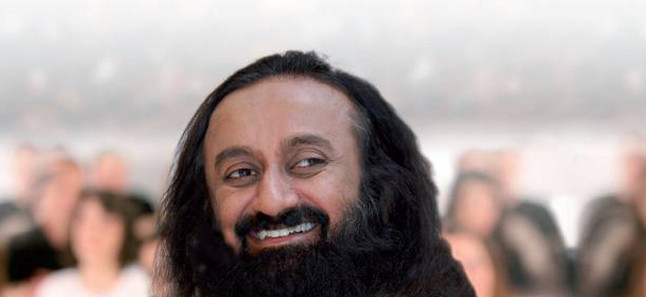"I love you, Gurudev" shouted a female participant from a 2,300-strong crowd. "Haaaan" – came a melodramatic response from the dais signalling a token of acknowledgement and evoking a thunderous applause from the audience. "So, what meditation shall we do today?" the 59-year-old man asked the listeners, who were engrossed in closely observing his every move. Without expecting an answer, he said "Okay. Let's start."
That is how Gurudev Sri Sri Ravi Shankar, fondly known as "Gurudev" or plainly "Gurudev" among his followers, kick-started his meditation session at the Art of Living Foundation's (AOLF) international centre in Bangalore, India. From the moment the white-clad heavily-bearded man walked towards the podium occasionally waving his black sunglasses to the time he sat on the lone-but-well-decorated chair, there was uniform applause and hand gestures from the crowd extolling Shankar.
In the Indian spiritual world of hugging saints, twisting babas and levitating swamijis, Shankar is a notable figure with his AOLF's presence in 155 countries. As one follower put it during a conversation: "The AOLF's offices exist pretty much everywhere across the world." After a short pause, she added: "Maybe not in Antarctica." As many as 370 million people across the world have taken either a meditation or a breathing course under the AOLF.
To put the AOLF's massive strength in sheer numbers, its upcoming 35th anniversary celebrations are expected to be attended by 3.5 million people on the outskirts of Delhi. While Prime Minister Narendra Modi, with whom Shankar enjoys a good rapport, will inaugurate the three-day event on 11 March, President Pranab Mukerjee will deliver the final address. More than 36,000 musical exponents will perform on a makeshift stage set up over a seven-acre area – equivalent to six football grounds. The event has stoked a controversy in India over the choice of the venue – the flood plains of the Yamuna river.
Amid the domestic uproar, the Indian guru also has his eyes set on yet another volatile venue – the Middle East conflict zones – to help resolve the ongoing battles. In his room at the sprawling 100-acre campus in Bangalore, Shankar sat right next to a three-foot Krishna statue carved out from what appears to be sandalwood for an exclusive interview with the IBTimes UK. Shankar insisted he is hopeful of having peaceful negotiations with the Islamic State (Isis).
Taking a cue from his negotiating role in the Colombia crisis between Farc (Revolutionary Armed Forces of Colombia) rebels and the government, Shankar said he would leave no stone unturned to convince the Islamists terrorising in Iraq and Syria to drop their weapons. Shankar's intervention in the Colombia conflict in 2015 was not only instrumental in achieving the peace accord but also won him the southern American nation's highest civilian award.
When asked whether he would be keen on brokering similar measures with the IS, Shankar said: "You know, I gave a call for them to have a dialogue. But their response was not a pleasant one. So, I'll wait for some time. I'll repeat the call again." Shankar received death threats soon after he offered to hold a dialogue with the IS.
Gurudev Sri Sri Ravi Shankar was involved in brokering peace negotiations between Farc rebels and Colombian governmentArt of Living Foundation
Asked if Shankar is hopeful of talks, he responded: "Well, I never feel hopeless... It is in my nature to keep pursuing the path of peaceful dialogue. You never know what will click and when. Even the Farc thing was nothing short of a miracle. In these 50 years of war, they never once talked about non-violence. But, suddenly they said they'll accept the principle of non-violence. So, always you should keep your mind open."
"Even if there is 1% of chance of having dialogue, I do not close the door."
During the course of his freewheeling interview, Shankar also spoke about the role of spirituality not just in conflict zones but also in politics as it helps to calm the mind and, in turn, leads to a stress-free life. It is not uncommon in Indian history for rulers to seek guidance from spiritual leaders allowing them to have a closer presence in the corridors of power.
In a similar vein, when asked about his close, if not intimate, ties with Modi, Shankar said: "For me, he is a wonderful prime minister. He is taking things in the right direction. If any ideas come to me, I will share with him." Modi and Shankar have known each since 1999 and their mutual admiration has only increased ever since the former came to power in 2014.
Asked whether he is the spiritual guru of the Indian prime minister, with a twinkle in his eyes, Shankar said: "This, you cannot ask me. You have to ask the student."
Courtesy : International Business Times
